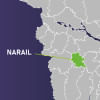‘NHRC can’t directly investigate cases involving law enforcers’

Dr Kamal Uddin Ahmed, chairman of the National Human Rights Commission (NHRC), talks about how the commission has dealt with the cases of enforced disappearance and human rights in general in Bangladesh over the past decade, in an exclusive interview with Naznin Tithi of The Daily Star.
How many cases of enforced disappearances has the NHRC investigated in the last 10 years?
From 2012 to 2022, we received complaints about 119 incidents, of which we registered 108. Some cases we registered on our own based on media reports. There were cases that were resolved following proper procedure. In 28 cases, those who had disappeared came back after a year or so. In some cases, the alleged victims of disappearance were later found to have been arrested and in jail.
For instance, recently we were notified of a person in Jashore who had gone missing. His two wives arranged a press conference where they alleged that he had been made disappeared. We immediately took action and asked the police about his whereabouts. Police then informed us that he was actually in their custody. We learnt that he was a member of Hizb ut-Tahrir and was arrested by the police The person had another address in Dhaka's Khilgaon area, which his wives were not aware of, so they thought he had gone missing.
There are some cases that are currently under investigation. While we assign different state agencies to investigate the cases, we also have our own investigation team. But we lack technical capacity when it comes to conducting forensic tests, etc. And in some cases, we assign more than one agency to investigate the allegations, while our own investigation team also carries out its own probe. That's how the NHRC is working at present with its limited capacity.
While we assign different state agencies to investigate the cases, we also have our own investigation team. But we lack technical capacity when it comes to conducting forensic tests, etc. And in some cases, we assign more than one agency to investigate the allegations, while our own investigation team also carries out its own probe.
How many cases of enforced disappearances or custodial deaths have you investigated this year? According to Ain o Salish Kendra (ASK), at least seven individuals have allegedly died at the hands of law enforcement agencies while six people were victims of enforced disappearance between January and July this year.
There were complaints about three cases of enforced disappearance this year. The commission took suo motu notice of one other case based on media reports. In June this year, there was a report of an incident of enforced disappearance and death allegedly by the Detective Branch of police. A person named Alal Uddin was allegedly picked up by the state agency and there was no news of him for some days. We learnt of the case from a television report. When we sent a notice to the police, they told us that he had been taken to hospital where he had died of a heart attack. Their explanation was not satisfactory. I personally planned to go to the victim's family, but then learnt that his family had moved elsewhere out of fear. Although the family showed no interest in further investigation, we proceeded with it. We asked the senior secretary to the Public Security Division to probe the case. They are supposed to submit their report on September 19. We also took a strong position on the death of Sultana Jasmine in Rab custody in Naogaon earlier this year.
I would like to mention here that we do not only look into the cases of enforced disappearances, extrajudicial killings, and custodial deaths; we also investigate other human rights issues across the country. But the media always focuses on these incidents, while other human rights issues do not always get the required importance. For instance, on August 27, The Daily Star reported that a 28-year-old man from the marginalised Rabidas community in Kurigram's Phulbari upazila had been beaten up by some goons allegedly hired by his neighbour, over a land dispute. They threatened to kill him and evict his family if they did not withdraw a case filed against the neighbour. Upon reading the report, we took action to support this man.
Of course, the NHRC should stand beside the victims in incidents of human rights violations. But don't you think when the law enforcement agencies, who are supposed to protect the people, carry out such crimes, that becomes more concerning? There are allegations that the NHRC does not talk much about such incidents.
I am not going to disagree with you. But other issues should also get importance. When journalist Golam Rabbani Nadim was killed, we went to his house, and I ensured myself that the police registered the case against his killers and arrested them. Police arrested 13 people in this case. When the Telugu people were evicted, I went there and ordered my team to investigate the incident. When the houses of Mro people were set ablaze by miscreants, I immediately went there and ordered an investigation and rehabilitation of the affected people.
The commission often says that it does not have the legal power to investigate cases against law enforcement agencies. But human rights activists believe that it can, as per the National Human Rights Commission Act, 2009. What's your view on this?
According to the act, we cannot directly investigate cases where law enforcers are involved. Although we ourselves cannot carry out such investigations, we can assign other agencies to do so. For instance, if the DB is involved in any such crime, we ask the PBI or CID to investigate. And we can also seek reports from the government on this.
Do you think the NHRC Act should be amended so that the commission itself can hold independent investigations into such cases?
We have recommended an amendment to Section 18 of the NHRC Act, which currently does not give the commission the direct power to investigate allegations against law enforcement agencies. It is now with the law ministry.

 For all latest news, follow The Daily Star's Google News channel.
For all latest news, follow The Daily Star's Google News channel. 











Comments